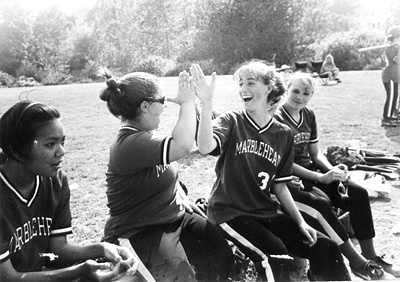All Nonfiction
- Bullying
- Books
- Academic
- Author Interviews
- Celebrity interviews
- College Articles
- College Essays
- Educator of the Year
- Heroes
- Interviews
- Memoir
- Personal Experience
- Sports
- Travel & Culture
All Opinions
- Bullying
- Current Events / Politics
- Discrimination
- Drugs / Alcohol / Smoking
- Entertainment / Celebrities
- Environment
- Love / Relationships
- Movies / Music / TV
- Pop Culture / Trends
- School / College
- Social Issues / Civics
- Spirituality / Religion
- Sports / Hobbies
All Hot Topics
- Bullying
- Community Service
- Environment
- Health
- Letters to the Editor
- Pride & Prejudice
- What Matters
- Back
Summer Guide
- Program Links
- Program Reviews
- Back
College Guide
- College Links
- College Reviews
- College Essays
- College Articles
- Back
Trophies MAG
A seven-year-old girl is playing in her first little league soccer game. She’s better than most of the girls her age, and dribbles up the field with surprising speed and tenacity. With the game on the line, the little soccer star breaks through the defense and strikes what could be the game-winning shot. She watches the flight of the ball, face showing anticipation and joy. But the ball sails just wide of the goal. Game over. As the players exchange high-fives and “good game”s, the girl turns to see her disappointed father walking briskly to the car.
Why do so many parents push their children so hard at such a young age? Maybe they want their kid to experience success. Maybe they feel their child’s failures as their own. Or maybe parents hope to save money by their kid earning a college scholarship. Regardless, it’s clear that a line has been crossed when it comes to the role parents play in youth athletics.
To the parents who think their child will be the next Derek Jeter or Brittney Griner, here are some stats from National Christian College Athletic Association research: only 2 out of 100 high school athletes go on to play collegiate sports at any level. One in 16,000 high school athletes attain a professional career in sports. And only 2 or 3 out of 10,000 high school players end up in the NBA or WNBA.
Those are very small odds.
Here are some bigger percentages: 65 percent of youth sports participants play to be with friends. Seventy-one percent wouldn’t care if the score was not kept in their games. Ninety percent would prefer to play on a losing team rather than warm the bench on a winning team.
The moral of the story: winning isn’t everything. Parents can get so wrapped up in their kid’s success that they are blind to what’s really important. Yes, kids should experience success, but they should also experience failure. And teamwork. And friendship. And most importantly, fun.
So parents, while your children might not bring home scholarships or championship trophies, keep this in mind as you watch them compete: Memories and life lessons gained at a young age are never forgotten, lost in the attic, or covered in dust sitting on a shelf.

Similar Articles
JOIN THE DISCUSSION
This article has 1 comment.

As an athlete myself, I have often witnessed parents pushing their children too hard in athletics. I wrote this piece as a reminder to parents and kids that there is more to sports than winning and college scholarships.